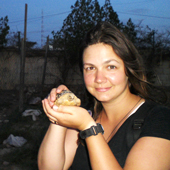
Dr. Kaira Wagoner (Biology) received new funding from the Arista Bee Research Foundation for the project “Unhealthy Brood Odor Assay Trials, Arista Bee Foundation.”
Despite numerous management and breeding interventions, the ectoparasitic mite Varroa destructor combined with the pathogens it vectors remains the primary biological threat to honey bee (Apis mellifera) health. Hygienic behavior, the ability to detect, uncap, and remove unhealthy brood from the colony, has been selectively bred for over two decades, and continues to be a promising avenue for improved Varroa management. Although the hygienic trait is elevated in many Varroa-resistant colonies, hygiene does not always confer Varroa-resistance, and existing Varroa-resistance selection methods tend to trade efficacy for efficiency.
Previously, researchers demonstrated that a mixture of synthetic honey bee brood compounds associated with Varroa and/or Deformed-Wing Virus infestation could be used to rapidly determine colony-level Varroa resistance of Minnesota Hygienic, Pollinator, and unselected honey bee lines. Here researchers propose analysis of the response of Carnica and Buckfast honey bee lines to this Unhealthy Brood Odor (UBO) assay. The proposed experiment will measure UBO assay response of 50-100 colonies already phenotyped for Varroa Sensitive Hygiene (VSH). These colonies will cover a broad range of VSH phenotypes, from low to high VSH performance. Results will indicate the ability of the UBO assay to measure the VSH trait, and will represent the first analysis of UBO assay performance in European honey bee lines. A tool for rapid VSH phenotyping of honey bee colonies has the potential to improve honey bee pest and disease resistance by informing apiary management decisions and facilitating the selective breeding of Varroa-resistant honey bee colonies.


